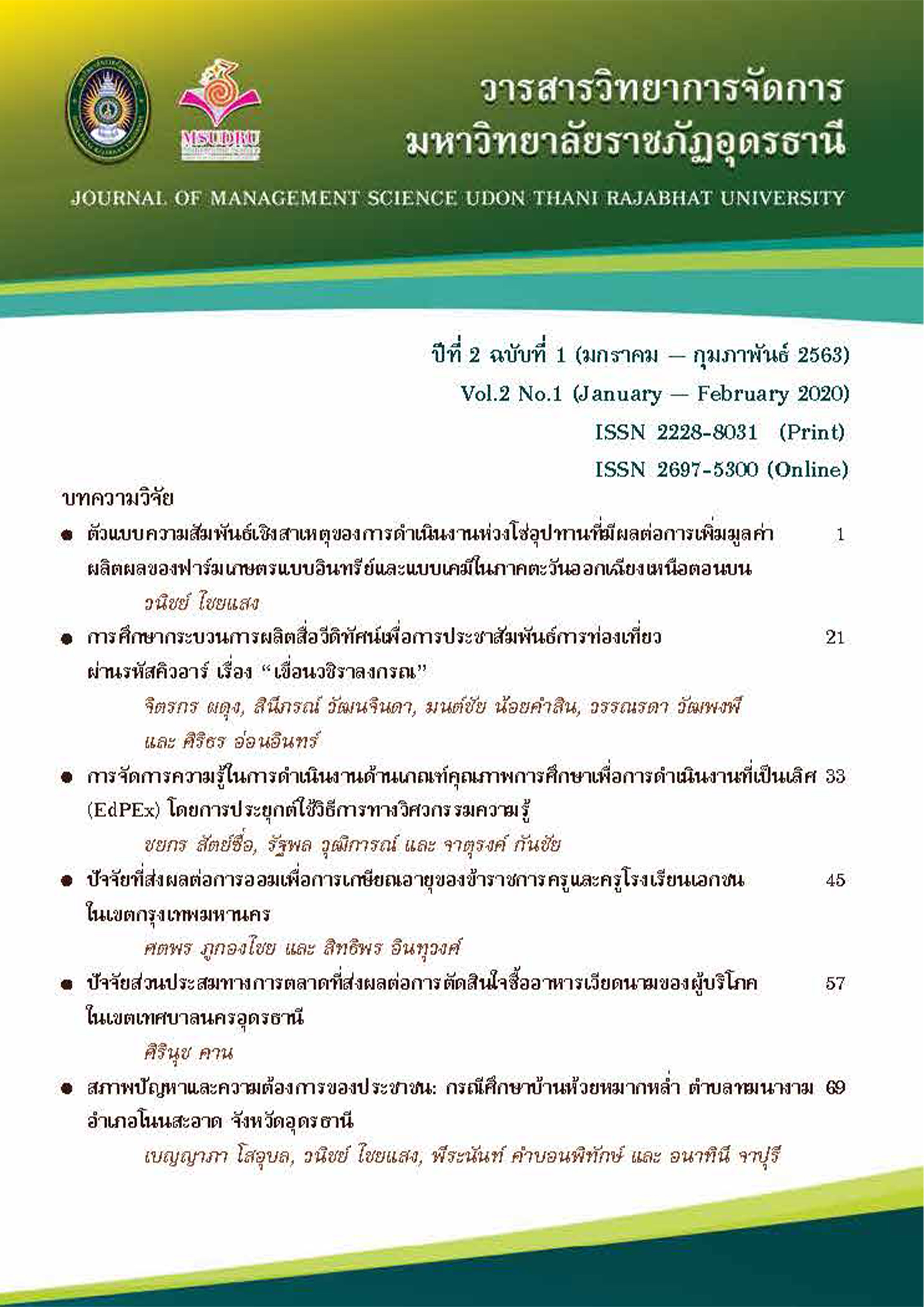KNOWLEDGE MANAGEMENT IN OPERATIONS OF EDUCATION CRITERIA FOR PERFORMANCE EXCELLENCE (EDPEX) USING KNOWLEDGE ENGINEERING
Main Article Content
Abstract
This research was to externalize and develop the electronic books on knowledge management in operations of Education Criteria for Performance Excellence (EdPEx) by knowledge engineering for comparing pre- and post-test by the electronic books to develop knowledge and understanding of Education Criteria for Performance Excellence (EdPEx).According to the analysis of the preliminary problems, the learning resources in term of EdPEx in Chiang Mai University were not enough for self-study, resulting in moat of the faculties and departments having knowledge and understanding in term of EdPEx at the moderate and low levels. The main cause was lacking understanding of criteria, methods and no instructors. The researcher focused on the explicit knowledge and tacit knowledge in operations in term of EdPEx from the prototype faculties, that is, Faculty of Medicine, Faculty of Agro-Industry and Faculty of Economics by using knowledge engineering and CommonKADs for developing quality electronic books in compliance with Gagne's learning theory as a guideline to solve the problem and test the samples of 12 faculties and 5 departments of Chiang Mai University. The result showed that the pre-test of the electronic books was at the moderate and low levels of knowledge and understanding in term of EdPEx. After studying the developed electronic books, the statistical comparison showed that the post-test result of the samples had no statistically significant differences from the pre-test result. Therefore, the media consumption behavior of the target group should be studied before developing the instructional media for learners in order to enable
Article Details

This work is licensed under a Creative Commons Attribution-NonCommercial-NoDerivatives 4.0 International License.
บทความที่ได้รับการตีพิมพ์เป็นลิขสิทธิ์ของคณะวิทยาการจัดการ มหาวิทยาลัยราชภัฏอุดรธานี
ข้อความที่ปรากฏในบทความแต่ละเรื่องในวารสารวิชาการเล่มนี้ ไม่ใช่ความคิดเห็นและความรับผิดชอบของผู้จัดทำ บรรณาธิการ กองบรรณาธิการ และคณะวิทยาการจัดการ มหาวิทยาลัยราชภัฏอุดรธานี ความรับผิดชอบด้านเนื้อหาและการตรวจร่างบทความแต่ละเรื่องเป็นความคิดเห็นของผู้เขียนบทความแต่ละท่าน
References
ชยากร โลห์ทองคำ. (2556). การนำสื่อเกมเรียนรู้ไปประยุกต์ใช้และวัดประสิทธิภาพการเรียนรู้ในธุรกิจซีพีเฟรชมาร์ท. การค้นคว้าแบบอิสระ ปริญญาวิทยาศาสตรมหาบัณฑิต สาขาวิชาการจัดการความรู้ มหาวิทยาลัยเชียงใหม่.
ซูม[นามแฝง]. (2560). คนไทยสมาธิสั้นลง จะดีหรือเสียในอนาคต?. สืบค้นเมื่อ 19 ธันวาคม 2560,จาก https://www.thairath.co.th/content/1000039.
นภา หลิมรัตน์. (2551). แหล่งข้อมูลด้านแพทยศาสตรศึกษา มหาวิทยาลัยสงขลานครินทร์. สืบค้นเมื่อ 25 สิงหาคม 2558, จาก http://teachingresources.psu.ac.th/document/2551/limrat/5Matching%20Questions.pdf.
น้ำฝน พิทักษาไพศาล. (2548). การศึกษาความสัมพันธ์ระหว่างพฤติกรรมการเรียนรู้กับการใช้สื่ออิเล็กทรอนิกส์ของนักศึกษาระดับปริญญาตรี มหาวิทยาลัยเทคโนโลยีพระจอมเกล้าธนบุรี. กรุงเทพฯ: มหาวิทยาลัยเทคโนโลยีพระจอมเกล้าธนบุรี.
ปรมะ สตะเวทิน. (2541). การสื่อสารมวลชน: กระบวนการและทฤษฎี. กรุงเทพฯ: ภาพพิมพ์.
พรรณี ชูทัยเจนจิต.(2545).จิตวิทยาการเรียนการสอน. พิมพ์ครั้งที่ 5. กรุงเทพฯ: เมธีทิปส์.
ไพโรจน์ ตีรณธนกุล และไพบูรณ์ เกียรติโกมล. (2543). การออกแบบและการผลิตบทเรียนคอมพิวเตอร์การสอนสำหรับ e-Leaning. กรุงเทพฯ: ซีเอ็ดยูเคชั่น.
ภาวิช ทองโรจน์. (2556). สภาสถาบันอุดมศึกษากับการพัฒนาอุดมศึกษา. สืบค้นเมื่อ 3 มีนาคม 2557, จาก http://www.dusit.ac.th/course/standard/no-3.pdf.
มหาวิทยาลัยเชียงใหม่. (2557). การแลกเปลี่ยนเรียนรู้ การจัดทำโครงร่างองค์กรและผลลัพธ์องค์กรตามแนวทาง CMU-EdPEx. เชียงใหม่: มหาวิทยาลัยเชียงใหม่.
รุจโจน์ แก้วอุไร. (2545). หลักการออกแบบบทเรียนคอมพิวเตอร์ช่วยสอนตาม แนวคิดของกา เย่. สืบค้น 25 สิงหาคม 2558, จาก http://www.bus.rmutt.ac.th/~boons/cai/gange.htm.
วัน เดชพิชัย. (2535). คู่มือการวิจัยและการประเมินโครงการทางการศึกษาและพฤติกรรมศาสตร์. ปัตตานี: มนตรีบริการ.
สำนักงานคณะกรรมการการอุดมศึกษา. (2550). กรอบแผนอุดมศึกษาระยะยาว 15 ปี ฉบับที่ 2 (พ.ศ. 2556). กรุงเทพฯ: กระทรวงศึกษาธิการ.
สำนักมาตรฐานและคุณภาพอุดมศึกษา. (2557). เกณฑ์คุณภาพการศึกษาเพื่อการดำเนินการที่เป็นเลิศ ฉบับที่ 2556-2557. กรุงเทพฯ: กระทรวงศึกษาธิการ.
อรพินท์ ศักดิ์เอี่ยม. (2537). การใช้ประโยชน์และความพึงพอใจที่เด็กได้รับจากการชมรายการโทรทัศน์สำหรับเด็ก. วิทยานิพนธ์ปริญญามหาบัณฑิต ภาควิชาการสื่อสารมวลชน จุฬาลงกรณมหาวิทยาลัย.
Defleur, M. (1989). Theories of mass communication (5th ed.). New York: Longman.
Schreiber, G., Akkermans, H., Anjewierden, A., de Hoog, R., Shadbold, N., van der Velde, W., & Wielinda, B. J. (2000). Knowledge Engineering and Management. The CommonKADs Methodology, Cambrigde: MIT.
Thorndike, Edward L. (1966) Human learning. Cambridge: MIT.


